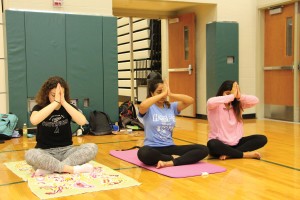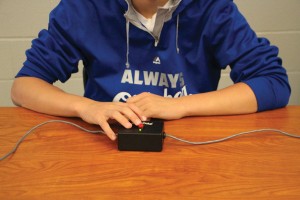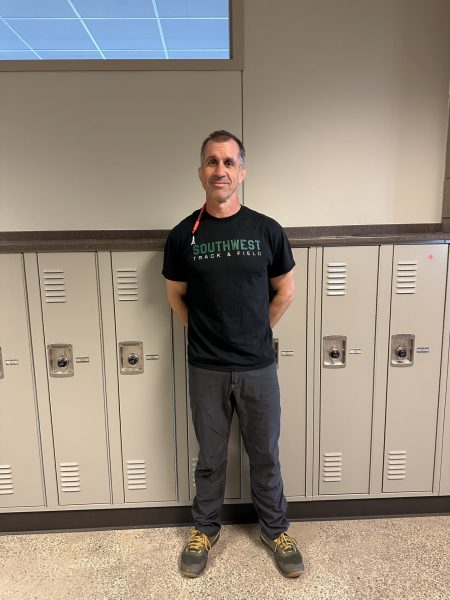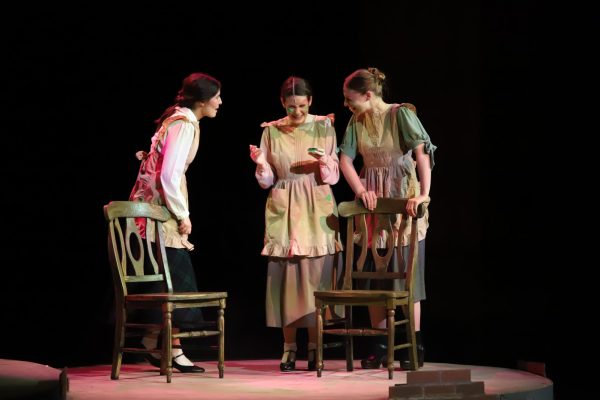Students express themselves through clubs
After finishing her math homework, senior Sneha Bhavanasi closes her laptop and looks at her next assignment for the night. The deadline for an essay is coming soon, yet she is not quite mentally prepared to start. The task of school has weighed heavily on Bhavanasi, so she decides to take a break. Instead of checking her phone, she decides to get back on her laptop and look through a multitude of songs to play on her ukulele. As the music starts to flow and the chords begin to resonate, the stress slowly fades away, giving Bhavanasi energy to complete her homework.
Many students face the same problem of school-related stress that Bhavanasi has faced multiple times. In order to reduce stress, The National Institute of Mental Health recommends finding a stress coping activity, whether it be meditation or, specifically for Bhavanasi, playing the ukulele.
Many students require different ways to relieve their stress, and for a select few, they take their activity to administration and start a club for it. Surrounding themselves with like-minded students, they meet on a weekly basis to escape the stresses of school.
Bhavanasi, before she begins the first words of her essay, finds her specific relaxation in the comforting chords of the ukulele club.
“It’s a really laid back environment — we like to play and sing a little,” Bhavanasi said. “The ukulele is a really cool instrument, and it’s really underappreciated.”
Although Bhavanasi began to play the ukulele a year ago, she said it has developed into a passion for her, as it is a surefire way to improve her spirits whenever she needs it, especially in the midst of a mountain of homework.
“It makes me happy; it brightens up my mood, and then I’m ready to focus again,” Bhavanasi said.
The stress-reducing effects of music Bhavanasi mentioned are supported by a 2013 study conducted in part by the University of Marburg. The findings concluded that music alters the psychobiological stress system, for when a stressor was introduced into test subject’s environment, those listening to music responded with less stress than those who were not. The stressors in high school students’ lives can change, whether it be friendship drama or an upcoming test, but regardless, music helps the stress levels of the individual, specifically in Bhavanasi’s case.
For senior Nekä Wingert, a simple poem she discovered in middle school has changed the way she has dealt with stress and found herself a new favorite pastime.
“I remember in eighth grade, I found a poem titled ‘It’s Funny How,’” Wingert said. “It’s an ironic poem, but I really liked it, and it has gotten me into poetry,”
Wingert said she enjoys both writing and listening to poetry to relax, but in order to do that she set up an environment that emphasizes a fun, relaxed atmosphere that prevents any stress that might be correlated with school-assigned poetry.
“It’s a safe place — we wouldn’t judge you; it can be something about your life,” Wingert said. “I wanted people to have a place where they could express themselves and read things they wouldn’t usually share.”
This comfortable and open-minded environment Wingert strived to create can be a potential release for many, as poetry has been proven as a long-term stress therapy method. In a test of 97 patients with secondary Post-Traumatic Stress Disorder, patients showed a decrease in symptoms from their trauma through poetry therapy. The results are applicable to the poetry club too, as poetry has proven to be a relaxation technique for many in the club.
Wingert’s mission to help people feel comfortable, in addition to being a stress reliever, has translated successfully, as senior Izabella Borowiak-Miller has learned to put her thoughts into poetry, especially when in stressful situations.
“People should come join poetry club to express themselves,” Borowiak-Miller said. “Whenever I’ve been mad or sad, I just write a poem.”
When senior Lauren Browning needed a release from the relentless college applications and various stresses of senior year, she turned to yoga.
“Yoga helps me calm down and destress before my day starts,” Browning said. “For the rest of the day and throughout the week, I have that energy and focus.”
When Browning started the club, she had just two other members. After several weeks of meeting each Wednesday morning, the club has started to pick up more of a following, but they are still looking for as many people as possible to come relax.
“Just taking 30 minutes each Wednesday morning is a good time to watch the sunrise and be with some cool kids and take a moment to be a human,” Browning said.
Browning’s desire to destress before the day begins is becoming an increasing trend throughout America. Currently, Browning joins 18 million other Americans in her routine yoga, and most , as 76 percent of yogis reported that they felt reduced stress after 90 minutes of yoga per week, according to FitnessHealth101.com. Browning said the effect is clear, as she has learned to look at life in a new light.
“Yoga has been a reminder that in the middle of senior-year stress, there’s so many things going on around us that we forget to enjoy the present moment,” Browning said. “That’s what yoga is all about — breathing in your body, in the moment, with pure intention.”
After school every Thursday, Zach St. Clair co-captains the categories team through practice, going over trivia question after trivia question. Even though the team practices for high-stress situations on a local game show, Categories, St. Clair still manages a fun practice.
“Either you have an outlet for your useless knowledge or you can come be a part of the team and just have fun and learn a few things,” St. Clair said. “It’s a good atmosphere to come and hang out for half an hour every Thursday.”
Although academics were a large factor in the stress reported in the earlier studies, St. Clair thinks that not all academics have to be stressful. Instead, he finds a way to have fun with what he learns in school, because under the lights of the show, there is no ominous overhanging grade point average to stress about.
“It’s nice that you have a way to apply the knowledge that you pick up inside school or through random findings on the Internet,” St. Clair said. “It’s a good way to apply these things outside of tests and homework.”






















